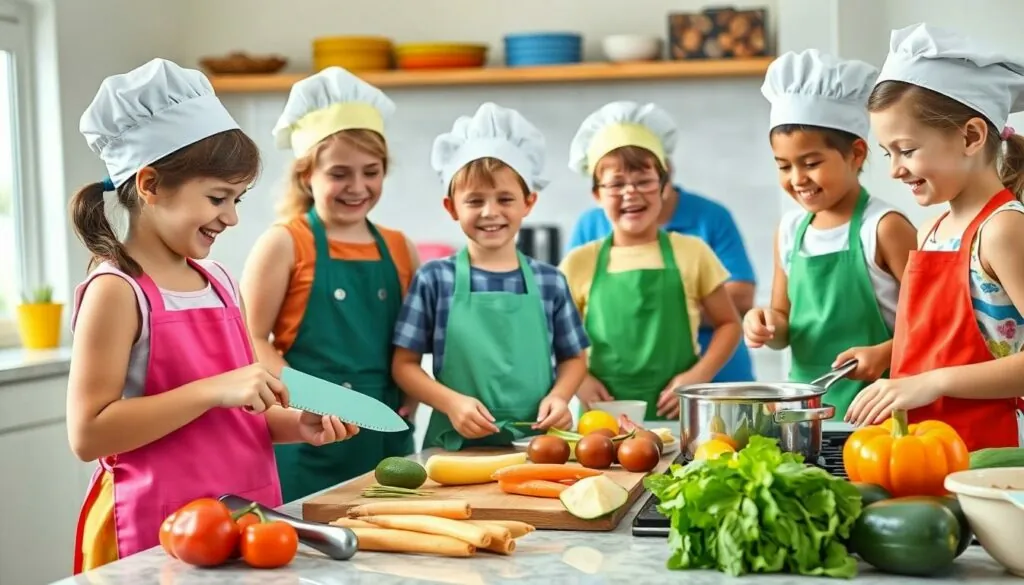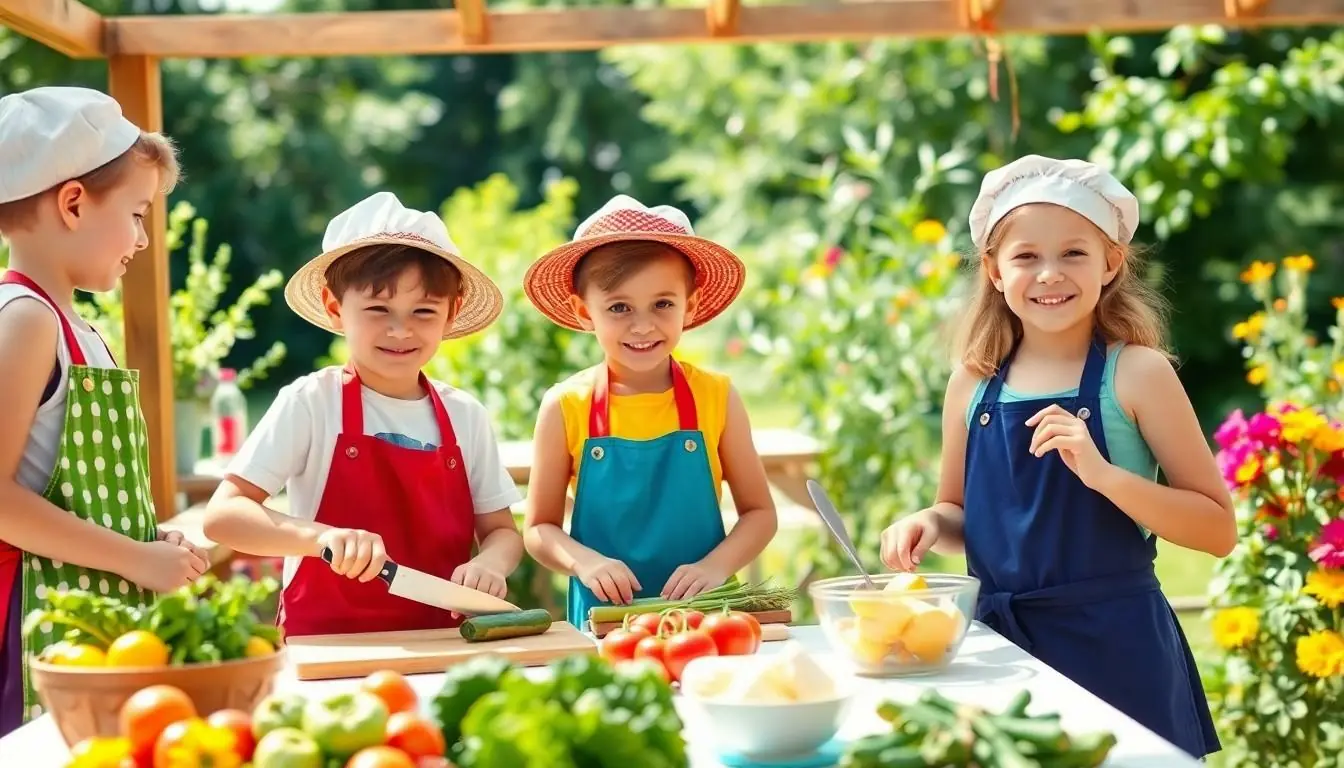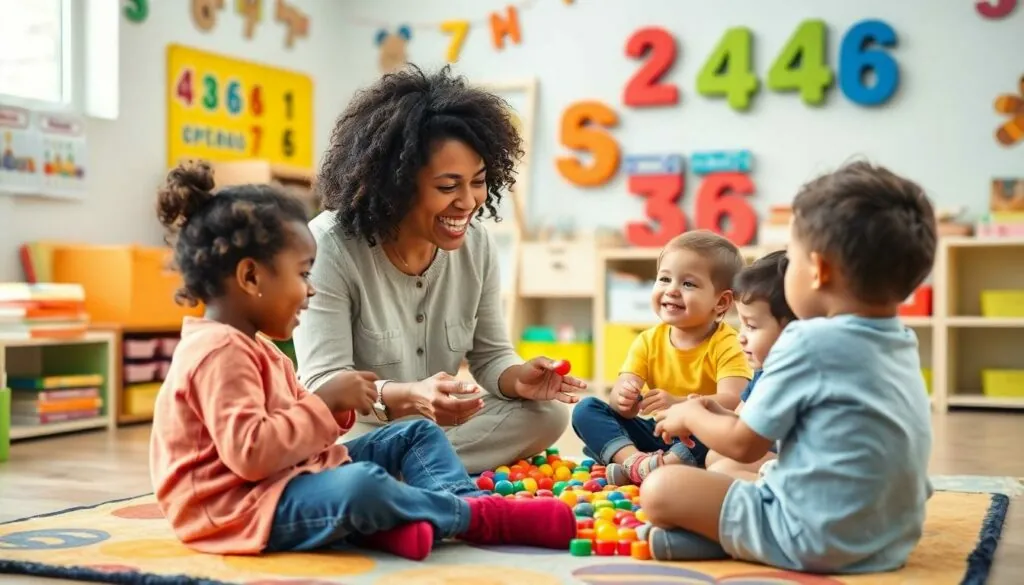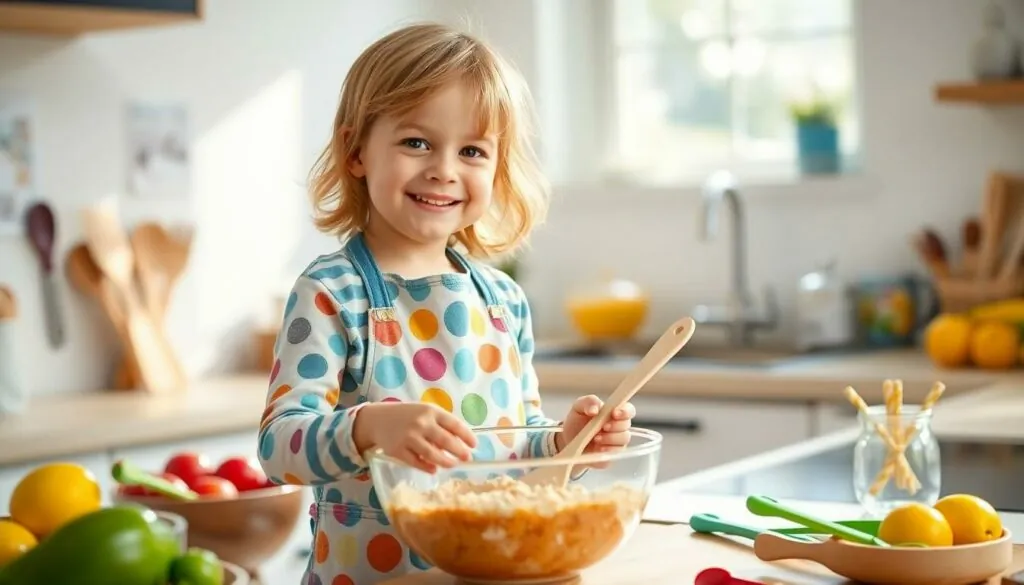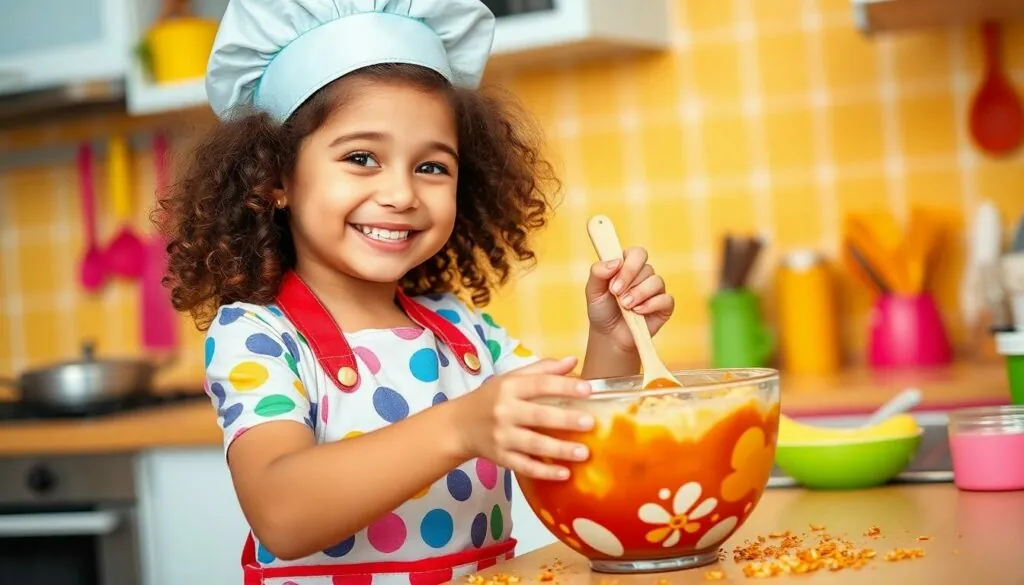Table of Contents
ToggleSummer break doesn’t have to mean endless video games and boredom. Kids cooking summer camps are transforming young minds into budding chefs while creating memories that’ll last a lifetime. These innovative programs combine hands-on culinary skills with exciting adventures making them the perfect recipe for summer fun.
In these specialized camps children learn everything from kitchen safety to advanced cooking techniques all while making new friends and building confidence. They’ll whip up delicious meals master essential life skills and maybe even discover their inner Gordon Ramsay (minus the colorful language of course). Best of all parents can look forward to having a little chef at home who might just surprise them with a gourmet dinner one day.
Benefits of Kids Cooking Summer Camps
Cooking summer camps equip children with essential culinary abilities while creating lasting memories. These specialized programs deliver a perfect blend of practical skills development combined with engaging social interactions.
Social and Life Skills Development
Kids cooking camps foster collaborative learning through team-based cooking projects. Children practice communication skills while coordinating meal preparation tasks sharing kitchen tools measuring ingredients. The camp environment encourages leadership qualities as experienced participants guide newcomers through recipes techniques. Kids develop patience time management abilities by following multi-step recipes organizing workstations cleaning up after activities. Group cooking activities create natural opportunities for children to:
- Share cultural food traditions with campmates
- Practice active listening during recipe demonstrations
- Learn conflict resolution through kitchen challenges
- Build friendships over shared culinary interests
- Develop respect for different dietary preferences customs
Building Kitchen Confidence
Hands-on cooking experiences empower children to master age-appropriate culinary techniques. Students progress from basic knife skills to creating complete recipes independently. The supportive environment allows kids to:
- Master kitchen tool safety procedures
- Learn proper measuring portioning techniques
- Understand ingredient substitutions modifications
- Create recipes from scratch without assistance
- Handle kitchen equipment with proper technique
| Skill Level | Kitchen Achievements |
|---|---|
| Beginner | Safe knife handling basic measurements |
| Intermediate | Recipe following meal assembly |
| Advanced | Independent cooking creative modifications |
What Children Learn at Cooking Camp
Children develop comprehensive culinary skills through structured lessons at cooking camp. Expert instructors guide participants through age-appropriate activities that build confidence in the kitchen.
Basic Kitchen Safety
Kitchen safety fundamentals form the core of cooking camp education. Campers learn proper hand washing techniques, food handling protocols, and safe kitchen behavior. Students practice using oven mitts, handling hot surfaces, and maintaining clean workstations. The curriculum covers kitchen tool safety, including proper knife grips, cutting techniques, and equipment operation. Children master fire safety protocols, appropriate clothing requirements, and emergency procedures specific to kitchen environments.
Essential Cooking Techniques
Cooking camps introduce fundamental culinary techniques through hands-on practice. Students learn measuring ingredients, reading recipes, and following step-by-step instructions. The program teaches basic knife skills, including dicing vegetables, mincing herbs, and creating uniform cuts. Campers explore cooking methods such as sautéing, baking, roasting, and boiling. Activities include mastering temperature control, timing coordination, and ingredient preparation techniques.
Nutrition and Meal Planning
Cooking camps integrate nutrition education into daily cooking activities. Students explore food groups, portion sizes, and balanced meal composition. The curriculum covers menu planning, grocery shopping strategies, and ingredient substitutions. Campers learn to read nutrition labels, identify whole foods, and make healthy ingredient choices. Activities focus on creating nutritious recipes, understanding dietary requirements, and exploring international cuisines. The program emphasizes seasonal ingredients, food sustainability, and mindful eating practices.
Choosing the Right Cooking Camp
Selecting an appropriate cooking camp creates the foundation for a successful culinary learning experience. Parents maximize their child’s growth potential by matching camp characteristics with individual needs.
Age-Appropriate Programs
Cooking camps organize participants into specific age groups to ensure suitable skill development. Programs for ages 5-7 focus on basic kitchen safety fundamental measuring techniques with close instructor supervision. Camps for ages 8-12 incorporate more advanced knife skills recipe reading responsibilities. Teen programs (ages 13-17) feature complex cooking methods menu planning creative recipe development. Each age bracket receives specialized equipment sized for small hands different developmental abilities. Instructors adjust teaching methods complexity levels based on age group capabilities.
Camp Duration Options
Summer cooking camps offer multiple scheduling formats to accommodate diverse family needs. Half-day sessions run 3-4 hours focus on specific culinary themes like baking international cuisine. Full-day programs operate 6-8 hours include expanded activities nutrition education field trips to local markets farms. Week-long camps provide comprehensive skill development through progressive daily lessons. Multi-week sessions enable deeper culinary exploration mastery of advanced techniques. Drop-in classes give flexibility for busy summer schedules while maintaining structured learning environments.
| Camp Duration | Daily Hours | Typical Activities |
|---|---|---|
| Half-day | 3-4 hours | Single theme cooking lessons |
| Full-day | 6-8 hours | Multiple recipes field trips |
| Week-long | 30-40 hours | Progressive skill building |
| Multi-week | 60+ hours | Advanced technique mastery |
Safety and Supervision Standards
Safety protocols form the foundation of kids’ cooking summer camps, ensuring a secure environment for young chefs to explore culinary skills. Comprehensive safety measures protect participants while fostering confidence in the kitchen.
Staff Qualifications
Certified culinary instructors lead cooking camp sessions with a minimum of 3 years professional kitchen experience. Each instructor maintains current food safety certifications including ServSafe Food Handler credentials. Staff members undergo background checks prior to employment alongside CPR certification requirements. The instructor-to-student ratio stays at 1:8 for ages 5-7 or 1:10 for older groups to ensure proper supervision. Assistant instructors support lead teachers with food prep monitoring station safety during hands-on activities.
Kitchen Equipment Guidelines
Age-appropriate equipment enables safe skill development for young chefs in training. Children ages 5-7 use plastic serrated knives specialized cutting boards specialty peelers with safety guards. Older participants access standard kitchen tools under direct supervision after demonstrating proper handling techniques. Each cooking station features:
- Non-slip cutting boards with juice grooves
- Heat-resistant silicone utensils for stovetop work
- Child-sized oven mitts rated for 500°F protection
- Clear plastic bowls with non-skid bases
- Individual induction burners with auto-shutoff features
- Adjustable height prep tables with non-slip surfaces
Equipment inspection occurs daily before each session starts. Damaged or worn items receive immediate replacement to maintain safety standards.
Recipe Types and Culinary Skills
Summer cooking camps expose children to diverse recipes ranging from simple breakfast dishes to complex international cuisines. Each recipe type introduces specific culinary techniques while building kitchen confidence.
Breakfast and Snack Preparation
Kids master essential morning meal preparation skills through hands-on practice with breakfast classics. They learn to crack eggs properly for omelets scrambles or frittatas. The curriculum includes creating whole-grain pancakes muffins quick breads from scratch. Students practice assembling healthy snacks like fruit parfaits granola bars energy bites using nutritious ingredients. Camp instructors demonstrate proper measuring techniques for dry wet ingredients ensuring consistent results. Children gain experience using basic kitchen equipment including mixing bowls measuring cups small appliances under supervision.
International Cuisine Exploration
Campers embark on a culinary journey through global food traditions featuring authentic recipes from multiple cultures. They create Italian pasta dishes Mexican tacos Japanese sushi rolls Thai stir-fries. Students discover unique ingredients spices cooking methods specific to each cuisine. The program incorporates cultural education teaching traditions customs behind signature dishes. Instructors guide campers through specialized techniques like rolling sushi properly folding dumplings making fresh pasta. Recipe modifications accommodate dietary restrictions while maintaining authentic flavors. Kids develop appreciation for diverse food cultures through hands-on preparation tasting sessions interactive demonstrations.
Conclusion
Kids cooking summer camps offer an invaluable opportunity for children to develop essential life skills while having fun in the kitchen. These programs create a safe and nurturing environment where young chefs can explore culinary arts build confidence and make lasting friendships.
The combination of hands-on cooking experience professional instruction and age-appropriate curriculum ensures that each child gets the most out of their summer camp adventure. From mastering basic kitchen safety to creating complex international dishes children emerge from these programs with newfound independence and a genuine appreciation for the culinary arts.
A cooking summer camp isn’t just about learning to prepare meals – it’s an investment in a child’s future that yields lifelong benefits and cherished memories.

